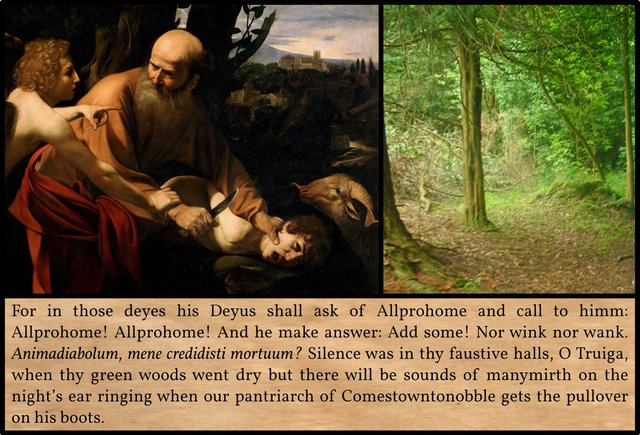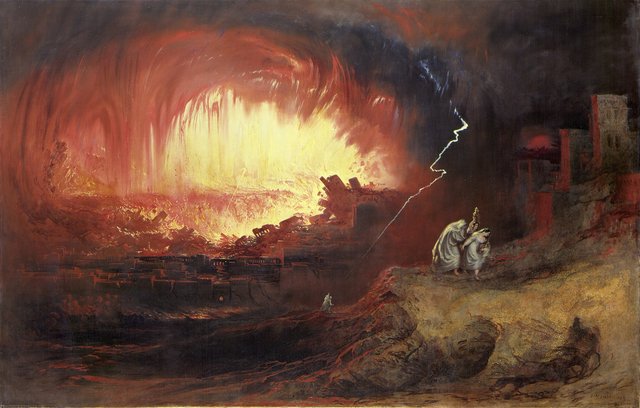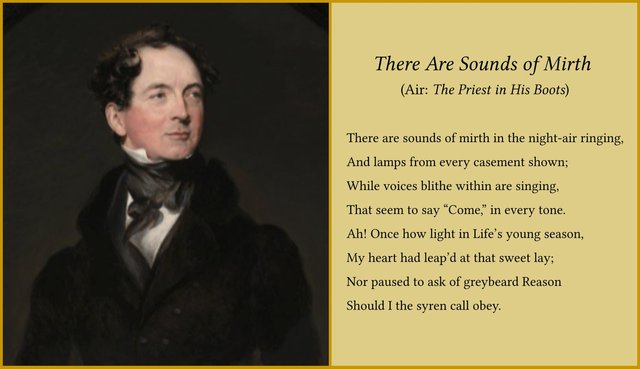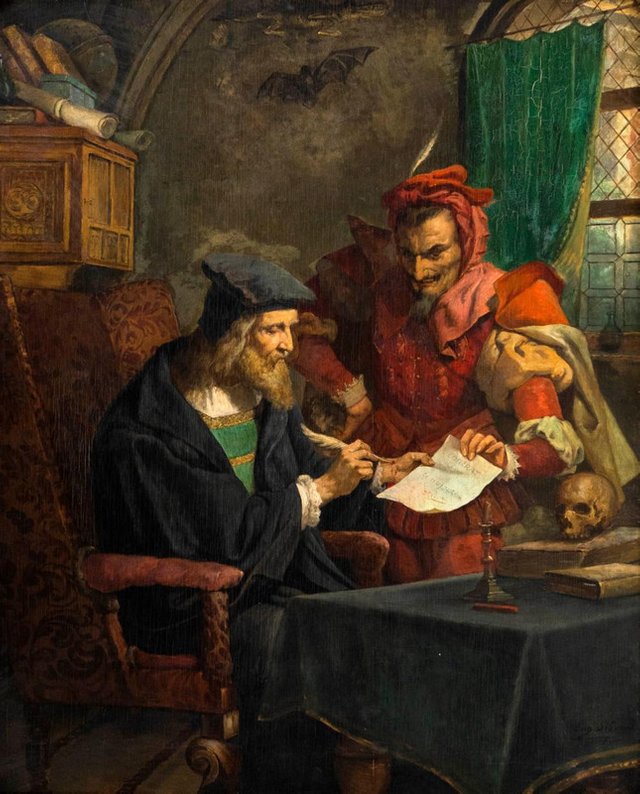For in those deyes

The last ten pages of Chapter 3 of James Joyce’s Finnegans Wake comprise an episode known as The Battery at the Gate, in which HCE suffers a sustained assault at the hands of an outsider. The final three paragraphs can be read as a short coda to this episode. HCE’s attacker has departed, leaving his hapless victim cowering alone in his hideout. But throughout this chapter HCE has been identified with his own attacker:
A striking feature of this chapter is its tendency to let the figure of the hero and his antagonists become merged. ―Campbell & Robinson 78
From this perspective, the departure of the latter in the direction of the deaf-&-dumb institute can be interpreted as HCE’s own death. His place of refuge is now his tomb. The gist of this paragraph, the second of the last three, is, as FWEET puts it:
for God shall call him―his return will dispel the silence.
In Finnegans Wake death is always followed by a resurrection.
First-Draft Version
As we have seen, the final four paragraphs of this chapter were additions to the first draft, which concluded with the bullocky proceeding in the direction of the deaf-&-dumb institute. When an early draft of the chapter was published in the third issue of transition in June 1927, only the second and fourth of these paragraphs had been added. The present paragraph was added in the early 1930s, when Joyce revised the text of transition 3. According to Rose & O’Hanlon, these revisions were made on Joyce’s copy of transition 3. The first version read as follows:
For in those deyes his Deyus shall ask of Allprohome and call Allprohome! Allprohome! And he make answer: Add some! Nor wink nor wank. ―JJDA
The final, published version adds a line from the ballad Finnegan’s Wake, translated into the Latin of the Vulgate Bible.

The Vulgate
This paragraph takes inspiration from a passage in Genesis, particularly in the Latin translation of St Jerome, the so-called Vulgate. Genesis 22 tells the well-known story in which God tests Abraham by commanding him to sacrifice his son Isaac, only to relent at the last moment:
And it came to pass after these things, that God did tempt Abraham, and said unto him, Abraham: and he said, Behold, here I am. ―Genesis 22:1 (King James Version)
Quae postquam gesta sunt, tentavit Deus Abraham, et dixit ad eum: Abraham, Abraham. At ille respondit: Adsum. ―Genesis 22:1 (Vulgate)
FWEET also suggests that Joyce’s Add some alludes to Genesis 18, in which Abraham haggles with God over the number of righteous people in Sodom for the sake of whom God will spare the city, though Abraham is subtracting rather than adding some:
And Abraham drew near, and said, Wilt thou also destroy the righteous with the wicked? Peradventure there be fifty righteous within the city: wilt thou also destroy and not spare the place for the fifty righteous that are therein? ... And the Lord said, If I find in Sodom fifty righteous within the city, then I will spare all the place for their sakes. And Abraham answered and said ... Peradventure there shall lack five of the fifty righteous: wilt thou destroy all the city for lack of five? And he said, If I find there forty and five, I will not destroy it. And he spake unto him yet again, and said, Peradventure there shall be forty found there. And he said, I will not do it for forty’s sake. And he said unto him, Oh let not the Lord be angry, and I will speak: Peradventure there shall thirty be found there. And he said, I will not do it, if I find thirty there. And he said, Behold now, I have taken upon me to speak unto the Lord: Peradventure there shall be twenty found there. And he said, I will not destroy it for twenty’s sake. And he said, Oh let not the Lord be angry, and I will speak yet but this once: Peradventure ten shall be found there. And he said, I will not destroy it for ten’s sake. ―Genesis 18:23–32
Latin: in diebus illis, in those days Although this is a common Biblical formula, it does not occur in Genesis 22 or 18. Why is days spelt deyes? There is an English surname Deyes, meaning Son of David, but it does not seem to be relevant here. Adaline Glasheen’s Third Census of Finnegans Wake does not contain any Deyes. In Chaucer’s Middle English deye means to die, which is probably why Joyce uses this spelling.
German: Himmel, sky, heaven.
Nor wink nor wank In the first edition of 1939 this read Nor wink nor wunk. I don’t understand either. At the top of this page there is an apparent allusion to the early printer Wynkyn de Worde (059.03), but I don’t think he is relevant here.
The allusions to the Latin translation of the Bible justify the Latin translation of the following line from the ballad Finnegan’s Wake:
Animadiabolum, mene credidisti mortuum?
- Latin: anima ad diabolum mene credidisti mortuum, soul to the devil did you [singular] think me dead? (Thanum ’on Dhoul, do ye [plural] think I’m dead?)

Thomas Moore’s Irish Melodies
The following lines allude to two of Thomas Moore’s Irish Melodies and the traditional airs to which they are sung. The gist is that the resurrection of HCE will dispel the silence:
Silence Is in Our Festal Halls Air: The Green Woods of Truigha. Truagh, or in Irish an Triúcha, is a barony in County Monaghan. The name comes from a medieval territorial division known as trícha cét, or thirty hundreds, which described an area of land capable of mustering 3,000 armed men.
There Are Sounds of Mirth Air: The Priest in His Boots. This song includes the line There are sounds of mirth in the night-air ringing, which is also echoed in this passage.
German Faust, fist. Faust made a deal with the Devil, as Abraham did with God.
ear ringing earring and tinnitus. HCE is hard of hearing (Earwicker = Ear-weaker). There may also be a call back to the Prankquean episode from I.1, which also alludud to deafness and dumbness:
Stop deef stop come back to my earin stop. ―RFW 017.16
Stop domb stop come back with my earring stop. ―RFW 017.35–36
- pantriarch of Comestowntonobble The Ecumenical Patriarch of Constantinople is the archbishop of Constantinople and the equivalent of the Pope in the Eastern Orthodox Church. But why is HCE identified with him? In their Skeleton Key to Finnegans Wake Joseph Campbell & Henry Morton Robinson interpret Truiga as an allusion to Troy, which is not too far from Constantinople. Or is our patriarch HCE planning to come down[stairs] and nibble something from the pantry when he reawakes?
gets the pullover on his boots
This final phrase has been understood to mean that HCE is not fully awake and when trying to get dressed he first puts on his boots and then tries to get his pants on over them, but he mistakes his pullover for his trousers. Moreover, Joyce always makes sure that allusions to Thomas Moore’s Irish Melodies mention the traditional air to which the song is sung. There Are Sounds of Mirth is sung to The Priest in His Boots. Perhaps this is the only reason for the appearance here of the Patriarch of Constantinople.

And that’s as good a place as any to beach the bark of our tale.
References
- Joseph Campbell, Henry Morton Robinson, A Skeleton Key to Finnegans Wake, Harcourt, Brace and Company, New York (1944)
- David Hayman, A First-Draft Version of Finnegans Wake, University of Texas Press, Austin, Texas (1963)
- James Joyce, Finnegans Wake, The Viking Press, New York (1958, 1966)
- James Joyce, James Joyce: The Complete Works, Pynch (editor), Online (2013)
- Danis Rose, John O’Hanlon, The Restored Finnegans Wake, Penguin Classics, London (2012)
Image Credits
- The Sacrifice of Isaac: Caravaggio (artist), Uffizi Gallery, Florence, Public Domain
- The Green Woods of Truagh: Keepers Wood, County Monaghan, © C Michael Hogan, Geograph Ireland, Creative Commons Attribution-ShareAlike 2.0 Generic License
*The Destruction Of Sodom And Gomorrah: John Martin (artist), Laing Art Gallery, Newcastle upon Tyne, Public Domain - Thomas Moore: William Essex (artist), National Gallery of Ireland, Public Domain
- Faust and Mephistopheles: Eugène Siberdt (artist), Private Collection, Public Domain
Useful Resources
- FWEET
- Jorn Barger: Robotwisdom
- Joyce Tools
- The James Joyce Scholars’ Collection
- FinnegansWiki
- James Joyce Digital Archive
